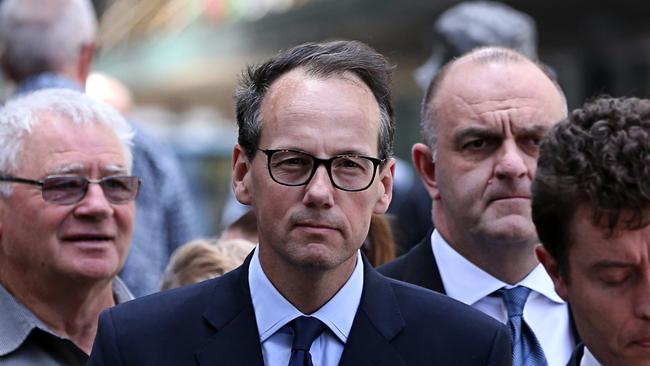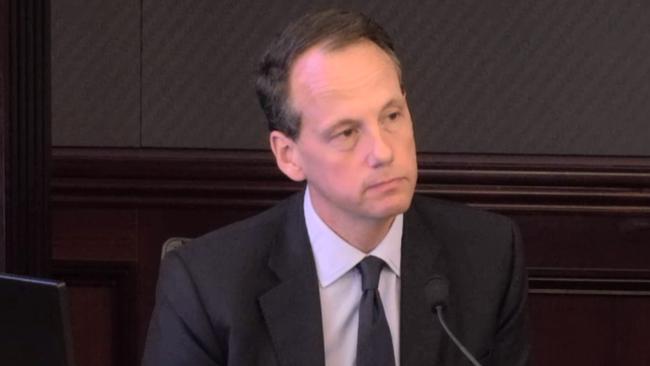ASIC chairman James Shipton says inadequate funding “weighs very heavily” on corporate regulator
ASIC’s boss has blamed inadequate funding for leaving it “heavily” hamstrung in “every aspect” of its work.

The chairman of the corporate regulator has blamed inadequate funding for leaving the watchdog “heavily” hamstrung in “every aspect” of its work chasing badly behaved bankers and rogue financial institutions.
Appearing at the royal commission, Australian Securities & Investments Commission chairman James Shipton said the government’s modest funding of its key regulator “weighs very heavily” on its ability to keep the financial system in line.
It’s further pressure on Canberra to dole out more funds to cash-strapped agencies ahead of next year’s federal budget. ASIC has complained of leaving its funding well short of what is needed to police the financial sector and live up to the demands of politicians, who have been bashing the regulator for being asleep at the wheel over the course of the royal commission.
“ASIC is under resourced compared to some of our peers globally,” Mr Shipton said. The equivalent Hong Kong regulators have a combined budget 50 per cent bigger to cover an industry a third the size.
Follow banking royal commission developments via our live blog
The Morrison government recently tipped an extra $70 million into ASIC’s coffers to help it launch legal cases against financial groups and to help it put officers inside large institutions. However, the piecemeal nature of the funding has continued to be criticised by the watchdog.
Mr Shipton said “modestly would be a good description” of the current funding for ASIC
“How does the level of resourcing that you have affect the way that you perform your functions and exercise your powers?” Counsel assisting the royal commission, Rowena Orr, asked.

“Well it weighs very heavily on the regulatory choices that we have to make, because it means that we are restricted in our ability to take on matters or to pursue matters in a way that, perhaps, we would like to,” Mr Shipton told the commission.
“We are constrained in probably every aspect of our regulatory work. It’s certainly in investigations, certainly in other matters relating to enforcement, but I would also make the case that we are constrained in our surveillance, our supervision, our important work on financial capability and other work that we undertake,” Mr Shipton said.
The government has been scrambling to top up budgets for authorities in the wake of the royal commission’s revelations ahead of a steady stream of civil and criminal cases to be pursued against firms and executives.
The Australian Prudential Regulation Authority was recently given an extra $60m, the Commonwealth Director of Public Prosecutions got a $42 million injection after the department complained that it lacked the funding to tackle the legal cases flowing from the banking inquiry, and the Treasurer has also earmarked a further $10m for the Federal Court of Australia over four years to fund two new judges and extra resources to handle an increased load of civil cases.
With ASIC’s expenses close to $400 million a year, the Australian Prudential Regulation Authority running at $130m and the Australian Competition & Consumer Commission costing taxpayers $200m, a tripling of funding could take the expense for the main financial watchdogs to close to $2 billion a year.
Mr Shipton’s comments come against a background of budget cuts for ASIC over the past few years, including a surprise $26m slashed from its departmental allocation in this year’s budget. The Abbott government’s 2014 budget cut $120m from ASIC’s budget, which was returned by then-treasurer Scott Morrison in 2016. In August, Mr Morrison gave ASIC a further $70m for new supervisory programs.
Under the government’s industry funding model, ASIC’s budget is constrained by the level the government appropriates in the budget, which is then paid back by the industry it regulates.




To join the conversation, please log in. Don't have an account? Register
Join the conversation, you are commenting as Logout